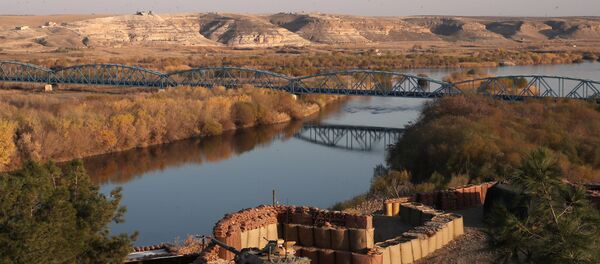"One fundamental principle of US foreign policy has been the creation and support of exclusive states until they fail," Canada-based political analyst Oussama El-Mohtar told Sputnik, shedding light on America's Mideast strategy.
The political analyst explained that the "exclusive state" is a state where citizens are not treated equally under the law.
"One group or more could be excluded from fundamental natural rights, or one group or more could appropriate superior rights the exclusion of others. Exclusion could be based on race, ethnicity, language, color, religion, sect, tribe, family, special interests, military or class. An exclusive state cannot be a democratic state," El-Mohtar elaborated.
The analyst pointed out that in the Middle Eastern Fertile Crescent, which includes Iraq, Syria, Lebanon, Jordan, Palestine and Israel, "an exclusive state is less likely to survive than anywhere else due to that region's diverse population mix, its unique geographical location, its coveted rich resources and the delicate balance among its neighbors."
The question then arises as to why the US continues to sow discord in the region by exploiting ethnic, religious and social differences and inequality.
According to El-Mohtar, it is the old colonial model that is behind the controversial trend.
"The American trend in its foreign policy has been to place 'exclusivist' leaders on weakened countries," he pointed out. "Those leaders would be dependent on the US for survival. They would allow it to devour their countries' rich resources while flooding their markets with US goods at very high prices. The leadership becomes wealthy, the population poor and oppressed, while Uncle Sam smiles benevolently."
"The Syrian Fertile Crescent is surrounded by three religious states: a Muslim Brotherhood Sunni state in Turkey, a Wilayet Al-Faqih Shiite state in Iran and a Whahabi Sunni State in Arabia. Embedded in its heartland, Palestine, there is a Jewish State. These are four exclusive states that will invite similar aspirations and that will be perpetually at war, directly or through proxy," El-Mohtar said.
The scholar warned that Syria and the rest of its neighborhood cannot survive such a state of affairs. "War and desertification are true existential threats to millions of people," he stressed.
Having said this, the analyst suggested that Russia, a proven global power, can reverse the trend promoted by the US and, previously, by European metropolitan states, in the region.
"I think it would be in Russia's best interest to support a strong secular and inclusive state in the Syrian Fertile Crescent. It would be in Russia's best interest to think outside the box and seek and support such forces, in order to reverse the destructive path that has marked this region for more than a century now," El-Mohtar concluded.
The views and opinions expressed by Oussama El-Mohtar, Ekaterina Blinova are those of the contributors and do not necessarily reflect those of Sputnik.




